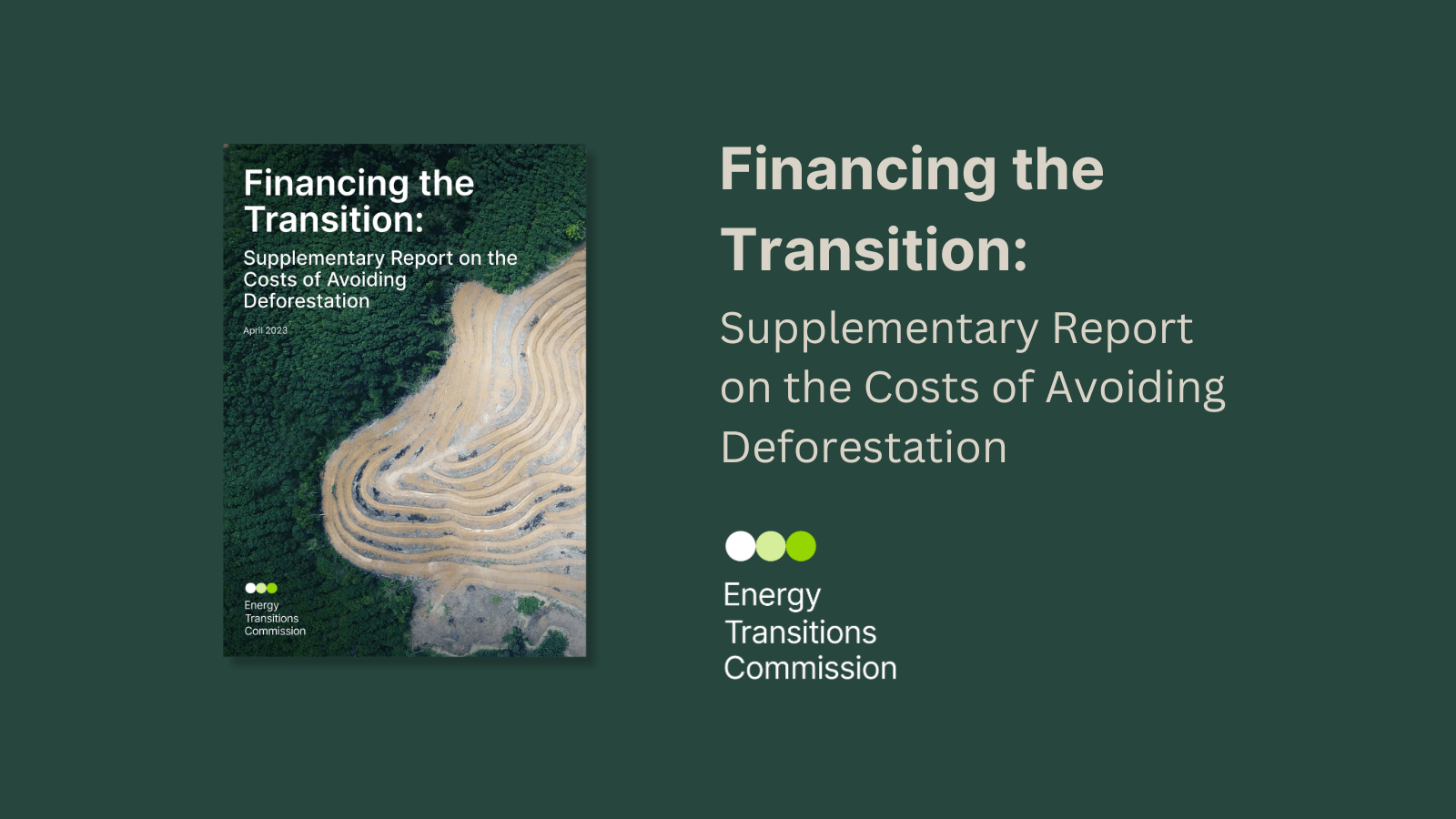New report from ETC highlights financial challenges and the need to address fundamental drivers of deforestation.
19 April 2023 – The global Energy Transitions Commission (ETC) has published a new report, Financing the Transition: the costs of avoiding deforestation, which presents new analysis of how much it could cost to overcome the economic incentive to cut down trees. The report explores the role that concessional/grant payments can play in avoiding tropical deforestation by 2030.
This is a supplementary report to Financing the Transition: How to make the money flow for a net-zero economy, published in March 2023. That report highlights the scale of finance required to build a net-zero global economy and to limit global warming to 1.5°C. It makes a distinction between two conceptually different categories of financial flow:
- Capital investment in the technologies and assets required to create a zero-carbon economy by mid-century. In some cases, these investments will not occur without changes in policy which reduce risks and the cost of capital, but in principle, these investments deliver a positive return to investors and lenders. $3.5trn/year is likely to be required on average between now and 2050.
- Concessional/grant payments to pay for decarbonisation actions which are critical to limiting warming to 1.5°C, but which will not occur fast enough without payments to economic actors to compensate them for lost profit opportunities. These are needed to phase down coal generation earlier than is economic, limit deforestation, and pay for removing carbon dioxide from the atmosphere. Around $300bn/year is likely to be required in middle and low-income countries this decade.
The costs of avoiding deforestation
Man-made deforestation is responsible for nearly 15% of total CO2 emissions but despite numerous pledges to halt it, it shows little sign of slowing. Many reports have estimated the cost per tonne of CO2 saved from avoiding deforestation but few have attempted to estimate what it would cost to put a total end to deforestation. The ETC’s new report, Financing the transition: the costs of avoiding deforestation, estimates the order of magnitude of concessional/grant payments required to compensate landowners for not cutting down tropical forests for profit (e.g., to raise cattle or grow commodities).
The report concludes that the cost of protecting all forests at high risk of deforestation by 2030 would be so large – in excess of $130bn/year – that it is not credible to assume that concessional/grant payments on this scale (paid for by corporates via voluntary carbon markets, philanthropy, and high-income countries) would ever be forthcoming. Currently, domestic and international finance to protect forests is just $2-3bn a year.
Non-financial actions will also be required to halt deforestation, via some combination of:
- A reduction in consumer demand for the main products that make deforestation profitable (in particular, animal meat and palm oil).
- The development of alternative businesses which can profit from standing forests (e.g., eco-tourism and various forms of sustainable agroforestry).
- Government actions to make deforestation illegal, if combined with effective enforcement.
But implementing these actions will take time and their impact will likely be inadequate for many years. Some level of concessionary/grant payments to offset the incentive to deforest will therefore be essential over the next decade to limit deforestation, buying time before more fundamental policy changes can be put in place.
The ETC concludes this new analysis by therefore recommending that at least $130bn a year of finance could make an important contribution to avoiding deforestation if targeted at some of the most at-risk areas of tropical forest – a 50-fold increase on today’s forest financing.
“Without a significant flow of concessional/grant payments, any reduction in deforestation will come too late to make it possible to limit global warming to well below 2°C, let alone to 1.5°C. But finance alone cannot deliver an end to deforestation. Action to reduce the fundamental consumer demands which are driving deforestation are also essential – and must be a priority for governments, business and consumers,” – Adair Turner, Chair, Energy Transitions Commission.
The question of who might pay for this required financing flow is addressed in the main finance report (Chapter 5, pages 65-72), where we present an ambitious but feasible financing strategy from high income country governments, corporates via voluntary carbon markets, and philanthropists. The issue of how to ensure that avoided deforestation projects and related carbon credits truly deliver reduced emissions is addressed in our Mind the Gap report (Chapter 5, pages 70-83), where we discuss the core principles required for integrity in carbon markets.
To read the supplementary report, visit: https://www.energy-transitions.org/publications/financing-the-transition-etc-avoiding-deforestation/
To read Financing the Transition: How to make the money flow for a net-zero economy, visit: https://www.energy-transitions.org/publications/financing-the-transition-etc/
Notes to editors
For further information on the ETC visit: https://www.energy-transitions.org
For the main report and infographics, visit: https://www.energy-transitions.org/publications/financing-the-transition/
Financing the Transition: How to make the money flow for a net-zero economy was published by the ETC in March 2023 and highlights that investments in clean energy must quadruple within the next two decades according to the Energy Transition Commission (ETC). Around $3.5 trillion a year of capital investment will be needed on average between now and 2050 to build a net-zero global economy, up from $1 trillion per annum today. Of this, 70% is required for low-carbon power generation, transmission, and distribution, which underpins decarbonisation in almost all sectors of the economy. Part of the investment needed will be offset by reduced investment in fossil fuels, cutting the $3.5 trillion per annum requirement to a net $3 trillion. This is equivalent to 1.3% of the likely average annual global GDP over the next 30 years.
Media contacts:
Caroline Randle, Energy Transitions Commission – [email protected]
Susan Brownlow – [email protected]


